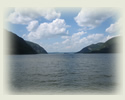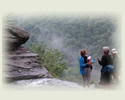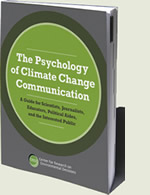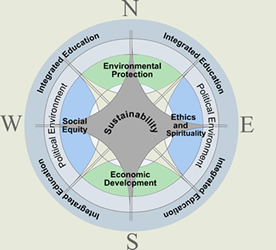
|
|||||
Overview |
|||||
River Summer is an ongoing project of the Environmental Consortium. A Journey of Discovery: River Summer
River Summer's mission and curriculum directly result from the needs and deliberations of Consortium institutions . Through participation in River Summer, like-minded faculty are coming together in a quasi "College of the Hudson Valley" to create cooperative education and research opportunities that are more ambitious and sophisticated than individual schools can accomplish alone. River Summer uses team teaching and participation among institutions that are geographically and ethnically diverse, with faculty who have access to a wide range of resources - from research universities to liberal arts and community colleges. During the program, educators take turns being students and teachers, learning and exploring new disciplines. Through River Summer, the Hudson Valley becomes an extended laboratory and classroom, where faculty members can gain new resources to enrich teaching at their home institutions. Development of this program has already built community and continues to promote collaborative relationships amongst faculty from diverse institutions. The program continues to grow a cohort of faculty throughout the Hudson Valley with like interests and a common experience. River Summer provides a sense of place to faculty and will spark new enthusiasm and ideas into their courses and research, through the use of the Hudson region as a common learning laboratory. Field and Place-Based Experience Using the geology, hydrology, and landscape of the River as a foundation, River Summer focuses on understanding the Hudson's natural resources within the context of its cultural history. River Summer's day-to-day program was created to integrate field/place-based experiences with cognitive and meta-cognitive research showing that people learn best when they take control of their own learning. It provides resources from which participants will draw in reconsidering teaching at their home institutions. River Summer pedagogy is based on the principles of cognitive psychology and immersive field-, place- and inquiry-based learning. Field programs have been found to provide memorable, transformative experiences for undergraduate students, and our experience with past River Summer years suggests it is equally effective with faculty. Using local resources and landscapes develops an understanding of the environment in which one works and lives, providing greater accessibility and deeper meaning. For faculty, proximity to the areas being studied also allows them to be developed into field visits in their own curriculum. The cognitive strategies of reviewing often, generating information actively, spacing learning sessions and including challenging or difficult materials will play central roles in the River Summer experience. (Son, et al. A metacognitive pedagogy: The River Summer Project) 2011 Itinerary 2011 Reading List The Psychology of Climate Change Communication |
|||||
|
|||||
Through River Summer, the Hudson Valley will become an extended laboratory and classroom to investigate the development of the watershed within an interdisciplinary framework. For further information about River Summer, contact: Margie Turrin at mkt@ldeo.columbia.edu or Tim Kenna at tkenna@ldeo.columbia.edu. For more information about the Environmental Consortium's programs, contact Michelle Land at mland@law.pace.edu. |
|||||



